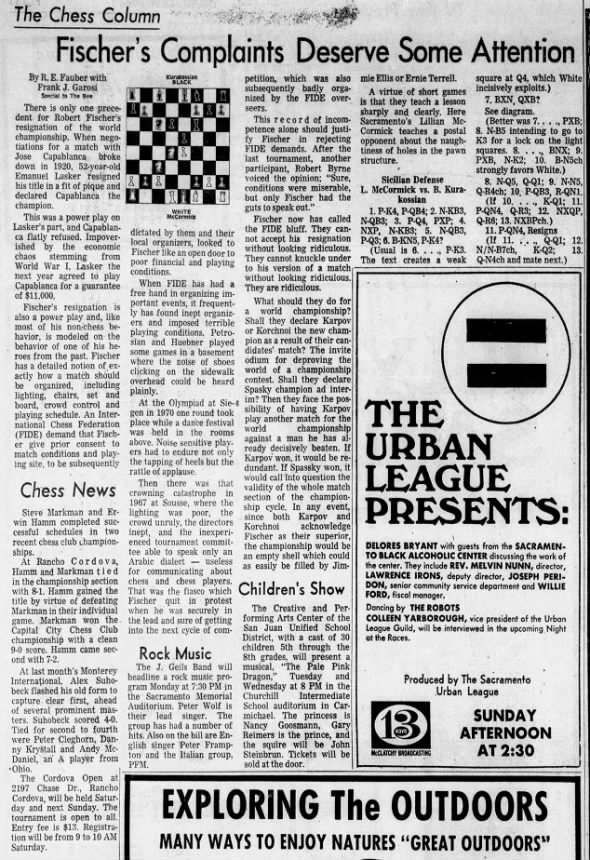< Prev Index Next >
 The Chess Column Sun, Jul 14, 1974 – 60 · The Sacramento Bee (Sacramento, California) · Newspapers.com
The Chess Column Sun, Jul 14, 1974 – 60 · The Sacramento Bee (Sacramento, California) · Newspapers.com
The Chess Column: Fischer's Complaints Deserve Some Attention
By R.E. Fauber with Frank J. Garosi
There is only one precedent for Robert Fischer's resignation of the world championship. When negotiations for a match with Jose Capablanca broke down in 1920, 52-year-old Emanuel Lasker resigned his title in a fit of pique and declared Capablanca the champion.
This was a power play on Lasker's part, and Capablanca flatly refused. Impoverished by the economic chaos stemming from World War I, Lasker the next year agreed to play Capablanca for a guarantee of $11,000.
Fischer's resignation is also a power play and, like most of his non-chess behavior, is modeled on the behavior of one of his heroes from the past. Fischer has a detailed notion of exactly how a match should be organized, including lighting, chairs, set and board, crowd control and playing schedule. An International Chess Federation (FIDE) demand that Fischer give prior consent to match conditions and playing site, to be subsequently dictated by them and their local organizers, looked to Fischer like an open door to poor financial and playing conditions.
When FIDE has had a free hand in organizing important events, it frequently has found inept organizers and imposed terrible playing conditions. Petrosian and Huebner played some games in a basement where the noise of shoes clicking on the sidewalk overhead could be heard plainly.
At the Olympiad at Siegen in 1970 one round took place while a dance festival was held in the rooms above. Noise sensitive players had to endure not only the tapping of heels but the rattle of applause.
Then there was that crowning catastrophe in 1967 at Sousse, where the lighting was poor, the crowd unruly, the directors inept, and the inexperienced tournament committee able to speak only an Arabic dialect — useless for communicating about chess and chess players. That was the fiasco which Fischer quit in protest when he was securely in the lead and sure of getting into the next cycle of competition, which was also subsequently badly organized by the FIDE overseers.
This record of incompetence alone should justify Fischer in rejecting FIDE demands. After the last tournament, another participant, Robert Byrne voiced the opinion: “Sure, conditions were miserable, but only Fischer had the guts to speak out.”
Fischer now has called the FIDE bluff. They cannot accept his resignation without looking ridiculous. They cannot knuckle under to his version of a match without looking ridiculous. They are ridiculous.
What should they do for a world championship? Shall they declare Karpov or Korchnoi the new champion as a result of their candidates' match? Then invite odium for deproving the world of a championship contest. Shall they declare Spassky champion ad interim? Then they face the possibility of having Karpov play another match for the world championship against a man he has already decisively beaten. If Karpov won, it would be redundant. If Spassky won, it would call into question the validity of the whole match section of the championship cycle. In any event, since both Karpov and Korchnoi acknowledge Fischer as their superior, the championship would be an empty shell which could as easily be filled by Jimmie Ellis or Ernie Terrell.






















